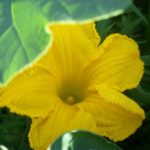
The sweet fragrance of basil (Ocimum basilicum) is filling up my kitchen as I make some final batches of pesto before summer ends. (Click here for my vegan pesto recipe.) From pizza, to sauces, to pesto, most people know basil as a culinary herb. But it has been used as a medicinal herb as well. A cup of basil tea is good for digestive problems and the plant has antibacterial properties.(1) However it is the history of the plant that has inspired mindfulness focus words for the week: creating meaning.
Royalty and Monsters
The meaning of basil’s name is a bit fuzzy. According to Margaret Grieve, author of A Modern Herbal, the word basil could have come from the Greek basileus, meaning king or regal. Certainly one could make a case for basil being the king of herbs. After all, the French call basil herbe royale.
But basil could also come for the Latin word for basilisk, a mythical serpent beast that kills with just one look. Harry Potter readers are of course familiar with the basilisk. One could assume this interpretation of the meaning was created to please Potter fans. But Grieve’s book was published in 1931, long before Voldermort had a pet basilisk. So take your pick. Basil is either named for royalty or a deadly serpent.
The meaning of the plant itself has changed depending on time and place. In some locations it was associated with love and protection, but in others it was thought to bring death and was associated with scorpions and the devil. There are references to the herb being an antidote to poisonous animals, but in other places it was thought to actually “breed venomous beasts”,
One of the magical attributes of the plant is that it can dispel confusion. I think that’s amusing given the confusion about its own name and history.
Assigning Meaning
Meaning is something we create from our own experience. And it often happens unconsciously. We have a reaction to an event and assign value, whether good or bad. Obviously over the centuries people had different experiences with and around basil. My experiences have all been shaped by wonderful garden and kitchen smells and sharing delicious food. However if I saw a scorpion (or baskilisk) emerging from a basil plant, that would certainly shape my thoughts about the herb in the future.
In contemplating the idea of creating meaning this week, we can bring a mindful focus to our automatic reactions and examine them with curiosity and non-judgement. What are the things that create meaning in our world, both positive and negative? What is our personal history with the meaning we’ve assigned? Are there any adjustments to meanings and opinions that we want to make?

For more information on Mindfulness Focus Words click here.
Footnotes and More Information on Basil
(1)Rodale’s Illustrated Encyclopedia of Herbs
Basil is an excellent source of vitamin K and manganese; a very good source of copper, vitamin A (in the form of carotenoids such as beta-carotene), and vitamin C; and a good source of calcium, iron, folate, magnesium and omega-3 fatty acids. Click here for more Health Properties of Basil


